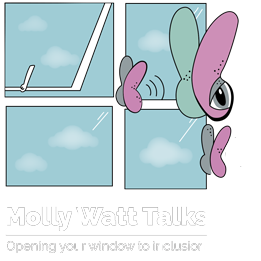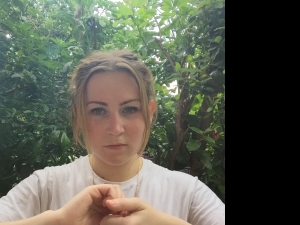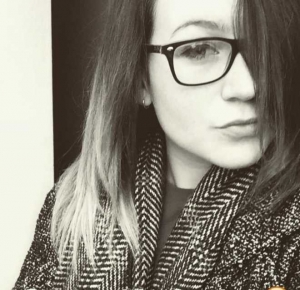Communication not Assumption
Until I was 12 I believed I could do most things, why not, I was deaf but with hearing aids could hear "ok".
The one thing I remember upsetting me back then was I couldn't hear on the telephone so couldn't speak to my grandparents who had moved far away.
It did make communication an issue sometimes, group settings, noisy environments, bad acoustics did make life more difficult but I did cope quite well lipreading in most situations but definitely always easier on an one to one.
Of course there would have been a few things I couldn't do but in the main I felt capable of most things.
To my surprise my disability was more of an issue to the outside world than to me.
This very strange assumption that firstly I would use sign language to communicate was the first barrier I came up against followed by the assumption I would use Braille!
I remember being very shocked at the thought as I had not met a first language signer until I was 14 years old and all I knew about Braille was learning about Louis Braille in Year 2 at Primary School!
I learnt to speak just like my older sibling accept I was slower and I needed specialist speech therapy and I learnt to read books in Primary School as I could see perfectly back then.
BSL is a beautifully visual language and I did learn it just to communicate with deaf people who use it, I'm not the best at it but I do my best as communication and inclusion is so important to us all.
I really struggle with sign language now my sight is so poor but if it is somebody's only way of communicating I can interpret if the environment is right, this means good lighting, not bright lighting and for the person signing to be at a distance that suits my small window of vision.
It is often said somebody with my eye condition (Retinitus Pigmentosa) can see a pencil but fall over an elephant getting to it!
The level of concentration for me to interpret is huge as I have to be very alert to scan, process and convert what I'm seeing into speech, that said I'm happy to do it if I can to help.
Being able to communicate with speech is a huge asset to me, particularly since I became deafblind.
Life is challenging but I am able to communicate with the larger society, it is larger society who need to realise not all deafblind or deaf people communicate with sign language and not all deafblind or blind people use Braille.
Also not all blind and deafblind people use voiceover!
I realise going from deaf to deafblind reduced my options hugely, causes confusion and is very misunderstood. However, I like to be the person who decides what I can and cannot do.
Having Usher Syndrome is incredibly exhausting without the constant questioning and almost disbelief that I am registered deafblind because I appear so "normal", that I can speak and that I can still read, albeit often only three or four words at a time and even having Unis my Guidedog usually results in the assumption that I am training her and now with my new hearing aids I have the luxury of, for the first time in my life, the ability to hear my iPhone via Bluetooth.
If I wanted to pretend something it certainly wouldn't be to be deafblind!
I'd like the assumption and patronising to stop and an understanding of who and what I am to begin and if you aren't sure of me lets communicate, I'm quite good at it!
Molly Watt - Speaker at Camp Digital March 2016
Job Title: Spearheading The Molly Watt Trust,
Ambassador for Deafblind Charity Sense
Advocate for those living with Usher Syndrome, Sensory
Impairments and Hidden disabilities.
Published author and illustrator of 2 children’s books.
Keynote and Motivational Speaker and keen Blogger.
twitter @mollywatttrust
I am 21 years old and registered deafblind as a result of Usher Syndrome. Usher Syndrome is varying deafness and blindness. The blindness is retinitis pigmentosa. There is no cure.
Usher Syndrome is not just ‘deafblind' it is much more. It brings challenges of communication, accessibility and mobility.
There is little awareness of my condition, being a hidden disability makes it all the harder to deal with and as a result little understanding by the world at large making it very difficult for all dealing with its many challenges.
Since my diagnosis at age 14 I have been raising awareness of Usher Syndrome, making basic videos, blogging and speaking publicly.
I won the award Young Deafblind Person of the Year in 2010 at age 16 for my awareness videos which are now used to educate those working with Usher Syndrome.
I have spoken in some amazing places including Harvard Medical School, Houses of Parliament, Hospitals, Schools, Charity Events to businesses and very recently at the Apple Campus in Cupertino.
My whole world is very much about accessibility.
I recently began consulting on website and app accessibility as well as blogging about accessible products, my http://www.mollywatt.com/blog/entry/my-apple-watch-after-5-days went viral and along with it came lots of interest in what I am trying to achieve.
Without assistive technology and my trusty guide dog Unis I would be a very different person.
I want to speak about the challenge and barriers I have faced and how technology helps. About the need for understanding all accessibility needs.
For accessibility to be an important part of every design, in technology, in public places, in everything.
I am very much looking forward to meeting and presenting to this influential audience.




